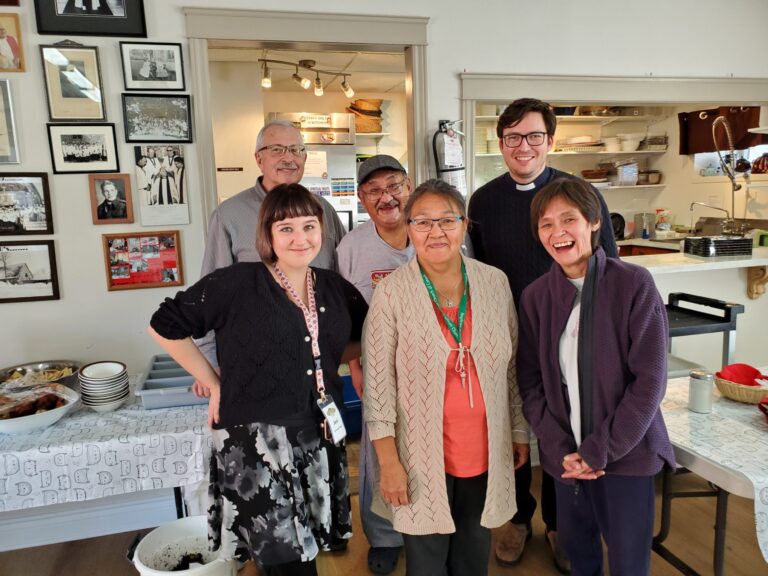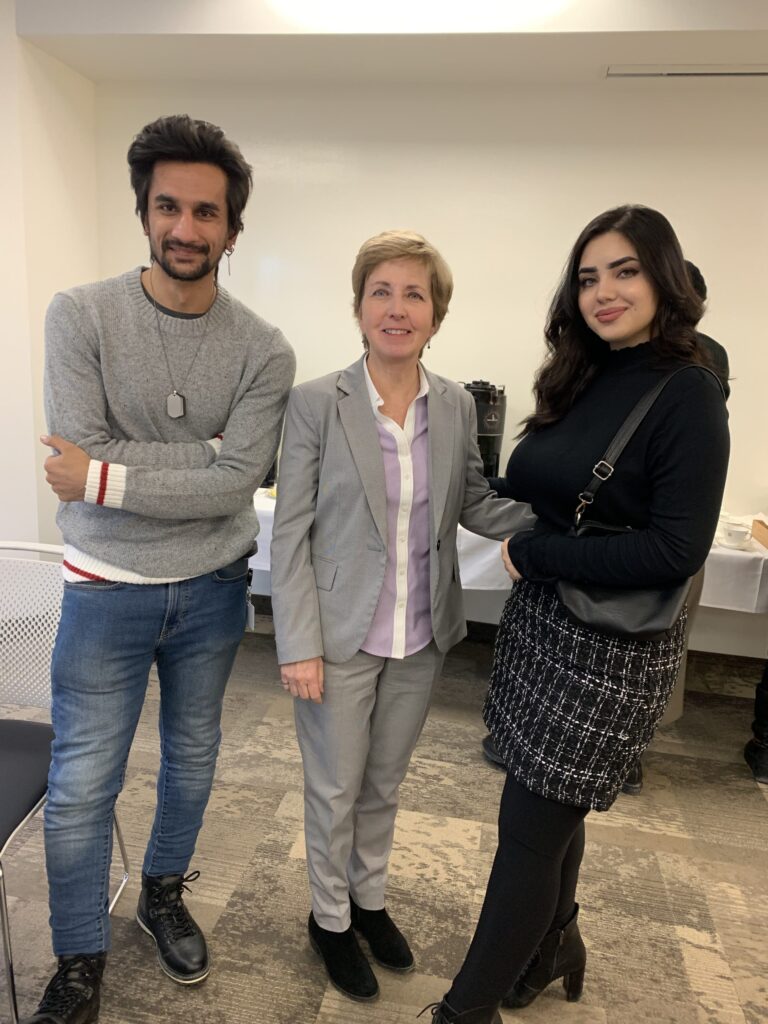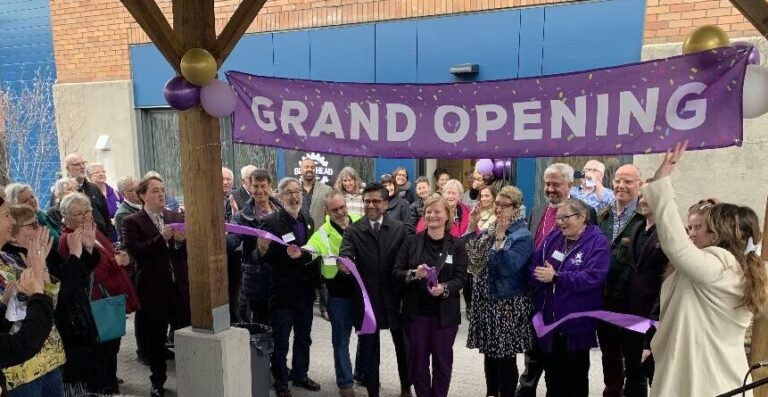St. Margaret’s Inuit congregation offers unique opportunity for sharing and reconciliation
When St. Margaret’s was built in 1887 as a church for the village of Janeville outside Ottawa, it was surrounded by fields and forest. But a hint of its future destiny as an urban church that is now home to the only Inuit congregation in the “South” of Canada may be glimpsed in the shape of its walls.
St. Margaret’s English-speaking congregation may see the semi-circular apse surrounding the altar only as a beautifully painted dome, but members of the Inuit congregation worshipping in Inuktitut at the 11:30 am Sunday services may see a comforting echo of the shape of the interior of an igloo.
But a church really is made up of the people who gather and worship there and not the walls of its building.
St. Margaret’s brings people together from its original congregation, those who came from All Saints Sandy Hill when it was dis-established, and the Inuit congregation. Serving them all with incumbent priest the Rev. Colin McFarland is a remarkable Inuit priest. When she came to Ottawa from the North, the Rev. Canon Aigah Attagutsiak never imagined entering the ministry, but now she draws the Inuit congregation and much of the growing Inuit community in Ottawa together.
Attagutsiak grew up in Arctic Bay, Nunavut. She came to Ottawa in 1998 and worked as a translator and case manager for the Akausivik Inuit Family Health Team. In an interview with Crosstalk, she said her mother, who is now nearly 103, loved going to church, and her 14 children studied Scripture at Sunday School.
When she began attending services at St. Margaret’s and then became a lay reader, the priests, including the Very Rev. Roger Briggs, who had served in the Diocese of the Arctic and presided at St. Margaret’s Inuktitut-language service at the time, and later the Rev. Jason Pollick, both asked her if she was interested in ministry. She said no repeatedly, but when the question kept coming up, she eventually discerned that it was not the priests but God calling her.
After studying with Briggs, attending annual courses at Wycliffe College in Toronto, and growing as a priest as she served the community, she was ordained as a deacon in 2014 and as a priest in 2015. Bishop Shane Parker appointed her to the Cathedral Canonry of Saint Mary Magdalene in 2022.
Once she made the leap to the ministry, was she glad she did it? Yes! Sharing is central to Inuit culture and Attagutsiak says she loves sharing the life of the community.
She shares in their good times— singing, telling stories, sewing and sharing community meals after Sunday services and in big celebrations like the Christmas feast when they bring “country food” directly from the Arctic.
But she also shares the weight of the hard times in the community. She often answers calls from the hospitals to offer pastoral care to Inuit patients and families.
She gets calls from treatment centres. She does memorial services at the Shepherds of Good Hope.
McFarland says Attagutsiak is involved in many Indigenous organizations as well, and her presence in the community is huge: “There’s the congregation and the parish, and then literally thousands of Inuit in Ottawa for whom [she is] visibly an important leader, spiritual connection, support.”
Attagutsiak who says she was “born to be busy,” credits the best support in both congregations for keeping her going. ”I would have given up long ago if I didn’t have that much support,”she said.
Sharing food is a big part of Inuit culture.
Attagutsiak offered an example from her home community: when hunters bring home an animal like a caribou, an announcement goes out to the whole community on the radio or on Facebook, so everyone can come to share the meat.
So, it is not surprising that she introduced the idea of potluck community meals after Sunday church services about seven or eight years ago.
Attagutsiak says she still misses the North “big time,” and knows how much her fellow Inuit miss home when they come to Ottawa for work, education, health care, or other reasons. St. Margaret’s is a place not only to receive spiritual comfort and education but also to connect with other Inuit, and their language and culture. She says hearing their own language spoken in the church services and at the community meal afterwards, and to sometimes enjoy Arctic foods is a comfort and remedy for homesickness.
The pandemic interrupted the Sunday community meals (which are no longer potluck}, but St. Margaret’s was able to start them again in the fall of 2022 with help from a $5,000 grant from the Anglican Foundation of Canada and a $10,000 grant from the Anglican Diocese of Ottawa’s Healing and Reconciliation Fund, which is administered by the All My Relations Circle.
The grants allowed St. Margaret’s to build on the previous success of the community meals.
Attagutsiak explained that there are a lot of challenges for many people in the Vanier area. There are higher levels of poverty, addiction, and violence than in other parts of Ottawa, and that makes it difficult to welcome everyone to the community meals and still ensure that everyone feels safe.
The grant money was used to hire Jeni Plouffe as a community host. “It’s a front-line position,” McFarland said, explaining that Plouffe is trained to de-escalate situations, use Naloxone to help in case someone has overdosed, and to know when to call for the right kind of assistance. “Having Jeni allows Aigah and I to stay focused on what we’re best at, enables the kitchen people to stay focused on kitchen work,” McFarland says. “If someone’s behaviour is making other people feel unsafe …[she] is the first person to respond.”
Once the current funding runs out in September, there is uncertainty about how to continue that aspect of the program.
“St. Margaret’s as a parish community already contributes to this with some hard cash and obviously the facility,” McFarland said. “There will always be a St. Margaret’s contribution. I would love to see two or three other parishes in the diocese with outreach funds …be willing to commit some, and I’m sure there are some individuals who would be keen to support this feature of the ministry,” he added.
“There is a distinct calling here,” he said. “What are we as the parish of St. Margaret’s and we as the Diocese of Ottawa doing to create space for Inuit parishioners, Inuit people to pray, plan, organize and implement ministry in a way that makes sense for them in this place. It is led by them. They have what they need in terms of skills and experience and creativity. I think the distinct aspect of the vocation of this parish is to create that space for empowerment.”
By Leigh Anne Williams on February 1, 2023
Crosstalk | February 2023, Parish News
Related Articles
February 1, 2023
Refugee ministry meets with Australian High Commission
April 24, 2024


